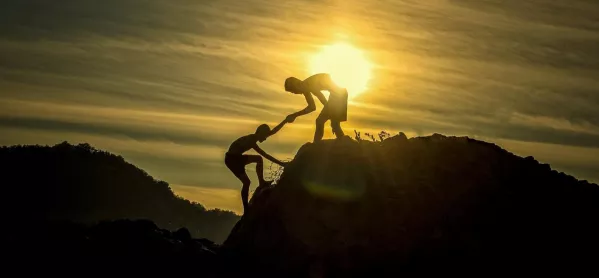- Home
- Coronavirus: Why mutual aid is now absolutely crucial
Coronavirus: Why mutual aid is now absolutely crucial

I’m involved in local community activism and a week before the lockdown, like thousands of others across the UK, I signed up to my emerging local mutual aid WhatsApp group to get involved in running errands for neighbours who may need to self-isolate.
I’ve worked on plenty of campaigns and actions in FE that have enabled students to directly respond to pressing issues in education; every one of those campaigns felt urgent, with a real imperative to make the lives of students better. But none of those felt like this - the immediate anxiety and urgency of the situation at hand and the potential for real change after.
Coronavirus: 10 great ways colleges are reaching out
News: ‘Without support, training providers won’t survive’
Watch: How one college is dancing through coronavirus
Mutual help
My local mutual aid group has grown exponentially over the weeks. There are more than 200 members in the central group for the area and smaller groups set up across different wards, all trying to get the word out to people locally that there’s a network of committed volunteers should people need them, triaging offers of support from residents, local businesses and community groups. We’ve seen similar activity happening across the FE sector - quick and effective communications; the sharing of resources, from lesson plans to catering supplies; and decisions being made on the ground locally on the best course of action in lieu of state decisions.
But what exactly is mutual aid and why is it so important and effective in a crisis like this?
Mutual aid is an egalitarian approach to reciprocally sharing resources, services, support and knowledge across communities. Although historically participating in acts of mutual aid has always been present in our communities, it was Russian anarchist activist and thinker Peter Kropotkin who eventually committed it to scholarly thought in Mutual Aid: a factor of evolution - his study of how species (including humans) survived through cooperation and collaboration rather than competition and conflict popularised by social Darwinist thinkers at the time.
And it definitely feels as though the only way we’re going to get through this period is through cooperation and collaboration, helping each other out, sharing resources and being community minded.
Covid-19 is going to affect everyone in our FE community. It’s not going to observe traditional power structures and hierarchies - students and apprentices, teaching and support staff, college and sector leaders, our families and friends. Many students and staff will be in key worker roles, or on a programme that’s training them for the types of jobs that were so dismissed only a few weeks ago. It’s imperative that as a community we support each other during this trying time.
A key part of mutual aid is taking part in actions that, whether in times of crisis or not, recognise that for one person to thrive, everyone must thrive. We can’t always wait for the state, governing institutions or charities to step in and act benevolently - rather, we must take an active role in collectively supporting one another through building new practices and social relations, ensuring everyone can have their basic needs met.
This might sound daunting but I believe that there are already practices that embody the values of mutual aid happening across the sector. One example is the much-loved #UKFEchat Twitter sessions on a Thursday night, which allow people to share expertise and resources freely, regardless of role or rank. Through politically and financially difficult times in FE, it has provided a space to come together that has not only mutually benefited the participants but modelled more egalitarian ways of communicating and sharing that have enabled other collaborations across the sector.
At last year’s Reimagine FE conference, I called for a radical reimagining of student voice where throughout both the curriculum and the management practices of providers, students were able to reflect and take action on social problems around them, challenging the status quo and taking these new ways of working with them into the community and into their workplaces. I hoped for small incremental changes in our sector that rippled out into the wider world.
As the crisis takes hold, we’re starting to see gaping holes in our communities that mainstream safety nets can’t reach, and inequality is becoming even more glaring. The mutual aid networks across the UK, which include many staff and students, are going to do their best to plug those holes, forming new social bonds and enabling communities to thrive during these trying times. When all this has subsided and we start to imagine what our colleges in this new future will do, the thing that’s getting me through this period is the real possibility that something radically different comes out the other side, not just for education but society more broadly.
The communities that colleges are part of will need us to act as catalysts for social change, fundamentally working in new ways - not just during times of crisis. If we’re serious about enabling communities to thrive, we must act with mutual aid at our core.
Katie Shaw is a freelance consultant in FE. She previously worked on adult education for UNISON and as policy and campaigns manager for the NUS students’ union
Keep reading for just £1 per month
You've reached your limit of free articles this month. Subscribe for £1 per month for three months and get:
- Unlimited access to all Tes magazine content
- Exclusive subscriber-only stories
- Award-winning email newsletters
